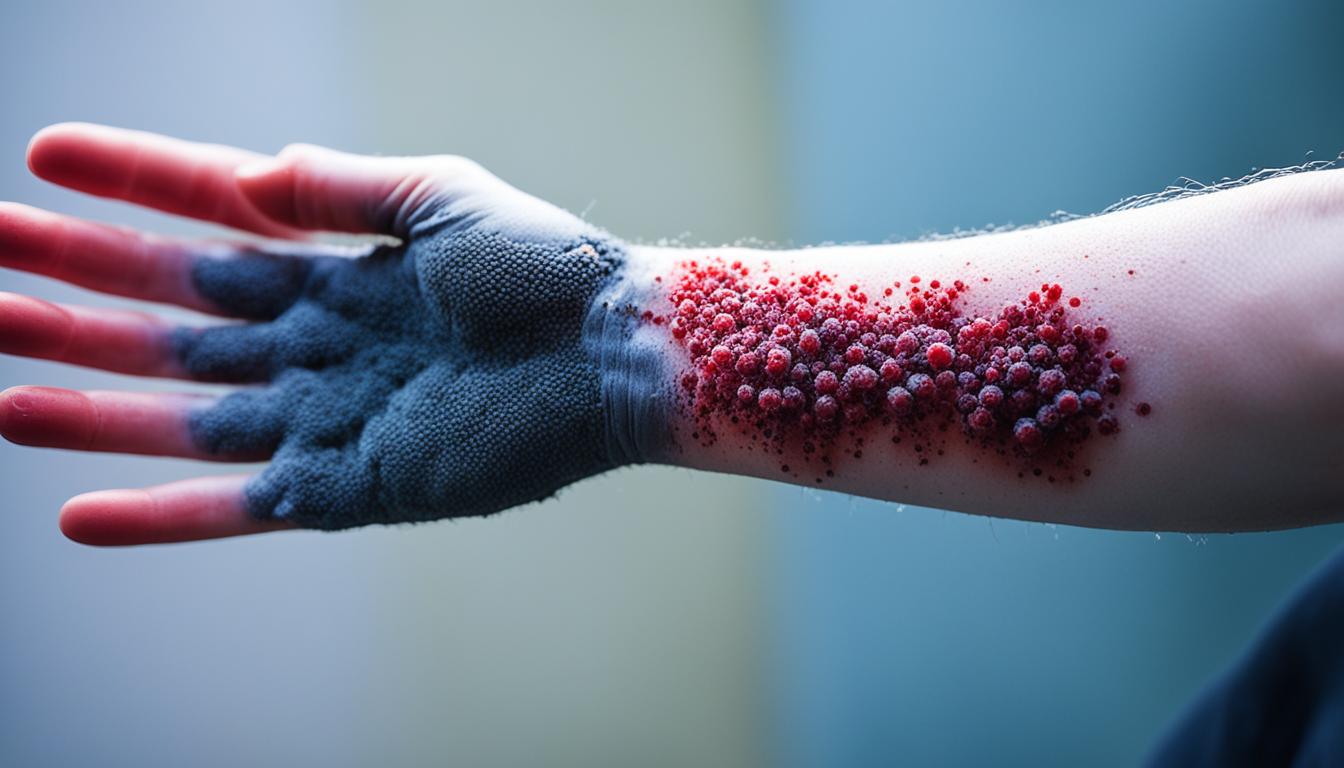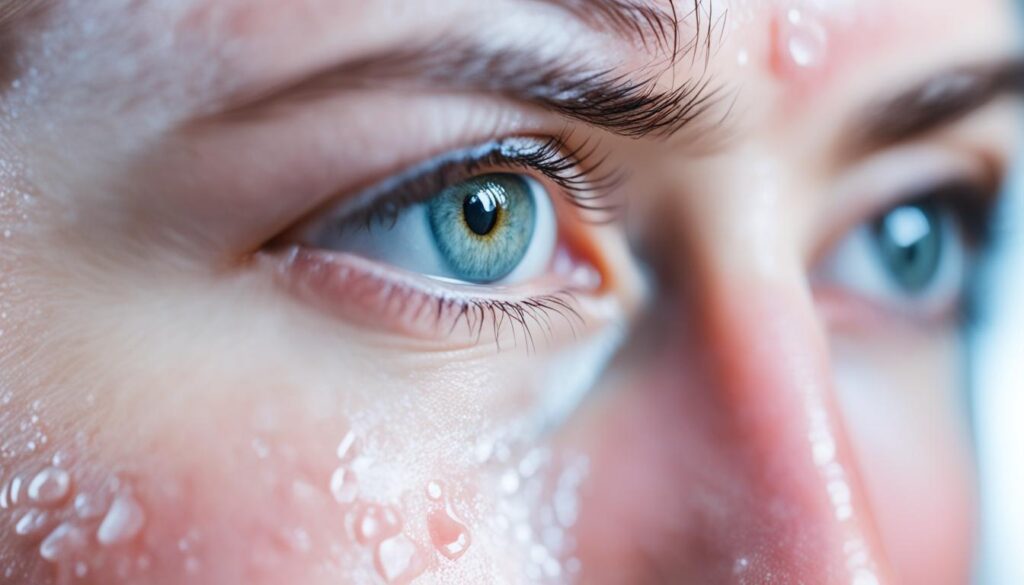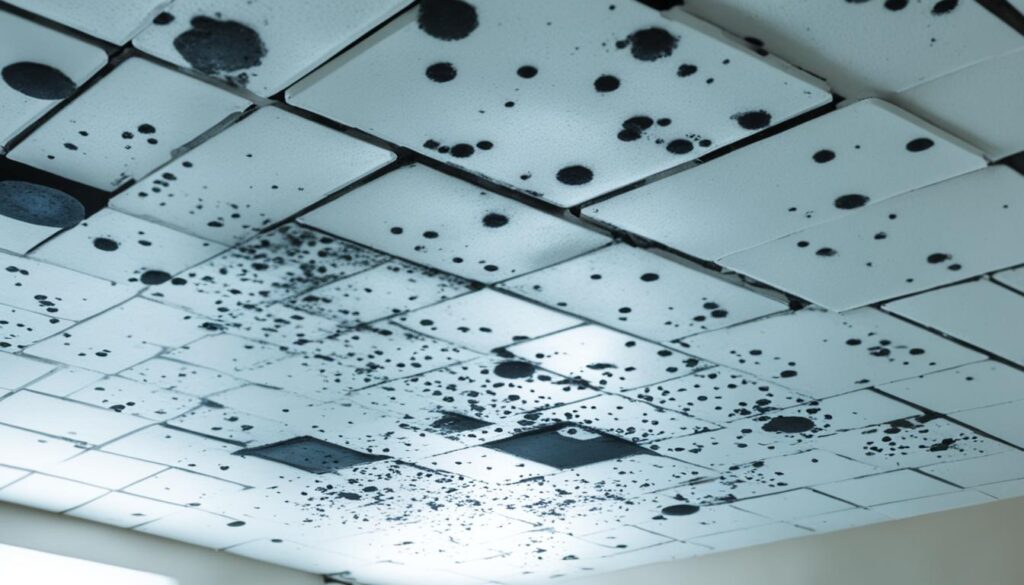
Mold Infection Symptoms in Florida: Know the Signs
Welcome to our article on mold infection symptoms in Florida. Living in a humid climate like Florida can increase the likelihood of mold growth and exposure in homes and workplaces. It’s essential to be aware of the signs of mold infection to protect your health and take prompt action when necessary.
Mold is a type of fungus that thrives in moist environments, and Florida’s warm and humid weather creates ideal conditions for its growth. When mold spores are inhaled or come into contact with the skin, they can cause a range of health problems. Recognizing the symptoms of a mold infection is crucial for early detection and effective treatment.
Some common symptoms of mold infection include:
- Coughing and sneezing
- Respiratory issues, such as wheezing and shortness of breath
- Itchy or watery eyes
- Nasal congestion
- Skin rashes or irritation
If you experience these symptoms and suspect mold exposure, it’s important to seek medical attention and identify the source of the mold. Addressing the underlying cause and removing the mold from your environment is crucial for your health and well-being.
Identifying mold exposure risks in Florida requires understanding the factors that contribute to mold growth. High levels of humidity, water leaks, poor ventilation, and damp indoor environments are common culprits. Regularly inspecting your home or workplace for signs of mold, such as musty odors or visible growth, can help you mitigate exposure risks.
Key Takeaways:
- Living in a humid climate like Florida increases the risk of mold growth and exposure.
- Mold infection symptoms include coughing, sneezing, respiratory issues, itchy eyes, and skin irritation.
- Seek medical attention if you suspect mold exposure and take steps to identify and remove the mold source.
- Frequent inspections and proactive measures can help mitigate mold exposure risks in Florida.
- If you need professional mold assessment or remediation services, contact a reputable company like Fix Mold Miami at 305-465-6653.
Being proactive in recognizing and addressing mold infection symptoms is crucial for Florida residents. By staying informed and taking the necessary precautions, you can create a safe and healthy living environment for yourself and your loved ones.
Common Mold Infection Symptoms
Exposure to mold can lead to a variety of symptoms in individuals living in Florida. These symptoms may vary in severity and manifestation from person to person. It is important to be aware of the common mold infection symptoms to promptly identify and address any potential health risks.
Allergic Reactions:
Mold exposure can trigger allergic reactions in sensitive individuals. Common symptoms of mold allergies include:
- Nasal congestion
- Sneezing
- Runny or itchy nose
- Watery or itchy eyes
- Coughing
- Wheezing
- Difficulty breathing
Respiratory Issues:
Prolonged exposure to mold can result in respiratory problems. The following respiratory symptoms may indicate a mold infection:
- Shortness of breath
- Chest tightness
- Respiratory infections
- Chronic cough
“Prolonged exposure to mold can exacerbate existing respiratory conditions such as asthma and bronchitis.”
Skin Irritation:
Mold exposure can cause skin irritation and allergic reactions. These symptoms may include:
- Rashes
- Itchy skin
- Redness
- Dryness
Mold infection symptoms can greatly impact the quality of life for individuals in Florida. If you or your loved ones are experiencing any of these symptoms, it is essential to seek medical attention and take appropriate measures to address the underlying mold exposure.

| Symptom | Description |
|---|---|
| Allergic Reactions | Symptoms associated with allergic responses to mold, such as nasal congestion, sneezing, and itchy eyes. |
| Respiratory Issues | Problems affecting the respiratory system due to mold exposure, including shortness of breath and chronic cough. |
| Skin Irritation | Reactions on the skin caused by mold, characterized by rashes, itching, redness, and dryness. |
Identifying Mold Exposure Risks in Florida
Florida’s warm and humid climate creates the perfect environment for mold growth. Whether you live in a coastal city or inland, mold can be a persistent issue that poses health risks to you and your family. Identifying and mitigating potential mold exposure risks is essential to ensure a safe and healthy living environment.
Causes of Mold Growth in Florida
The primary cause of mold growth in Florida is excessive moisture. With frequent rain and high humidity levels, buildings and homes can easily become damp, creating an ideal breeding ground for mold. Flooding, leaky pipes, and inadequate ventilation also contribute to moisture buildup, further increasing the risk of mold infestation.
Sources of Mold in Florida
Mold can be found both indoors and outdoors in Florida. Indoors, areas prone to mold growth include bathrooms, kitchens, basements, and areas with water damage. Outdoors, mold spores thrive in decaying vegetation, mulch, and damp soil. Additionally, Florida’s proximity to bodies of water such as the Atlantic Ocean and Gulf of Mexico increases the likelihood of mold spores being carried into homes by wind or through open windows and doors.
Identifying Mold Exposure Risks
To identify potential mold exposure risks in your Florida home or workplace, keep an eye out for the following signs:
- Visible mold growth: Look for patches of mold in damp areas or areas with water damage.
- Musty odor: Mold often emits a distinct musty smell, especially in enclosed spaces.
- Allergic reactions: If you or your family members experience unexplained allergic symptoms such as sneezing, coughing, or skin irritation, it could indicate mold exposure.
- Water stains or discoloration: These can be signs of hidden moisture issues and potential mold growth.
If you suspect mold exposure, it is essential to take prompt action to prevent further health risks. Hiring a professional mold assessment and remediation service is recommended to accurately identify the extent of the mold problem and ensure its safe removal.

Mitigating Mold Exposure Risks
To mitigate mold exposure risks in Florida, it is crucial to address any moisture issues promptly. Here are some preventive measures you can take:
- Keep humidity levels low: Use dehumidifiers to maintain humidity below 50% and ensure proper ventilation in bathrooms, kitchens, and other areas prone to moisture.
- Fix leaks and water damage: Repair any leaking pipes, roofs, or windows promptly to prevent moisture buildup.
- Proper ventilation: Use exhaust fans in bathrooms and kitchens to remove excess moisture during and after use.
- Clean and dry water-damaged areas: If you experience a water leak or flood, dry and clean the affected area within 24 to 48 hours to prevent mold growth.
- Monitor indoor humidity: Use a hygrometer to regularly monitor indoor humidity levels and take action if they exceed recommended levels.
- Regular maintenance: Conduct regular inspections and maintenance of your home or workplace to identify and address any potential moisture issues.
By being proactive and implementing these preventive measures, you can significantly reduce the risk of mold growth and protect yourself and your loved ones from mold-related health problems.
Conclusion
In conclusion, it is essential for Florida residents to be aware of the symptoms of mold infection. By recognizing these signs and taking prompt action to address mold exposure risks, you can safeguard your health and create a safe living environment. If you suspect mold in your home or workplace, it is advisable to seek the assistance of a professional mold remediation service like Fix Mold Miami at 305-465-6653. They are renowned for their expertise in mold assessments, prevention, and remediation in Florida.
Remember, early detection and mitigation are crucial in preventing mold-related health issues. By staying informed and proactive, you can effectively protect yourself and your loved ones from the harmful effects of mold exposure. Don’t wait for the symptoms to worsen or for the mold to spread. Take action today to ensure a mold-free environment.
For more information and guidance on dealing with mold, refer to the resources provided by local government agencies, health organizations, and reputable mold remediation professionals. Stay informed, stay safe!




